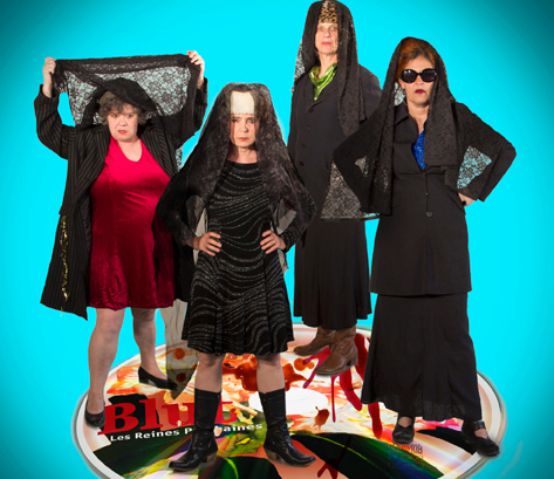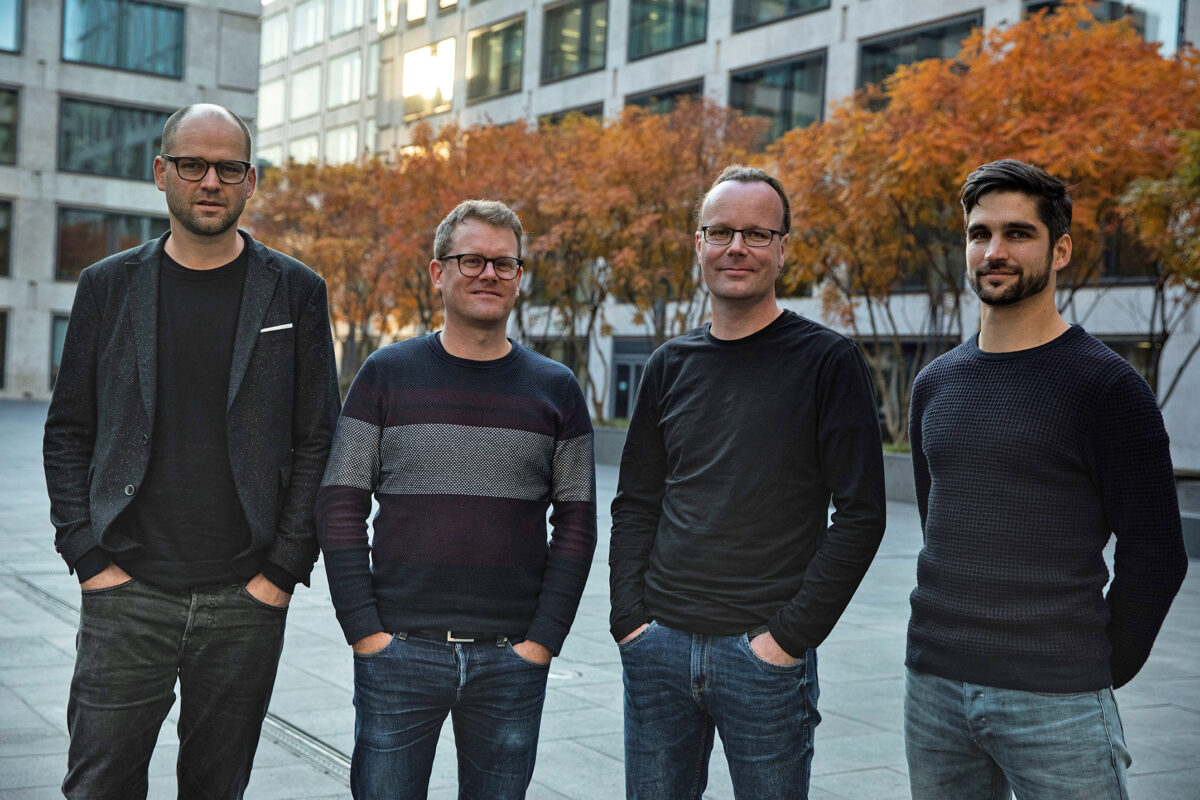"It's a statement to stand on stage as you get older."
In their studio in Kleinbasel, three of the four ladies in the women's band talk about the working process, about sticking with it and how things are almost a bit like the eighties again today

"Thinking alone is criminal" is their motto, professional dilettantism is their artistic concept and feminism is a matter of honor: the women's band Les Reines Prochaines, known for their quirky, multimedia performances, has been working as a collective since 1987, although the members have changed time and again. Only Muda Mathis has been there since the beginning. The four legendary artists Muda Mathis, Michèle Fuchs, Sus Zwick and Fränzi Madörin have several good reasons for their Swiss tour: Their freshly christened album Blut (SMZ 2/2013, p. 22), their new live program Syrup of Life and a documentary film about their shifting gears (directed by Claudia Willke).
There is a wonderful song on your album called "Oh what would I like to do". What would you like to be doing at the moment?
Muda Mathis: Now I'd like to be by the sea in the sun, under palm trees.
Michèle Fuchs: I would be there too and then we would meet by chance and eat fish.
Sus Zwick: And in between we would also give a concert.
Fuchs: ... that would be our South Seas tour.
If I wanted to become a member of the Reines Prochaines - even more so because of this tempting South Sea tour: What would your application process look like?
Mathis: We certainly wouldn't do any casting, quite the opposite: you would have to bring in your specific talents, represent them vehemently and then gradually grow into our lives.
Fuchs: But you could also come with a specific idea, which should have drive and be both exotic and modest. Basically, we are very curious about what we don't have yet.
You are talking about typical criteria for an idea. Is there a commitment to the long history of Pure Prochaine?
Fuchs: There is actually no limit to topics and ideas, but there is a limit to our abilities. We have appropriated certain media within this framework. Because we develop so much together, we have learned a common language over time. I always look to Muda, because she is our great thinker.
Mathis: Very good!
Les Reines Prochaines was created in the turbulent spirit of the eighties. Was there an approach to art and music back then that you miss today?
Mathis: It's more that I see similarities between the 1980s and today. Collaboration is now a priority again, as is political action. The eighties were ideological, we raised hopes with the big ladle and tried out other ways of life. Only now that we are seeing signs of this again do I realize what I actually missed in the interim. But maybe it's simply down to the different phases of life. You're rebellious in your 20s and then you become domesticated in your 40s.
How does domesticity manifest itself in Les Reines Prochaines?
Mathis: It certainly manifests itself in a kind of continuity and professionalism. We don't keep changing the band name. We don't keep breaking up the product. We don't withdraw, we keep at it. The nineties were really shitty and boring. In the noughties, we were somehow registered as strange women and became part of the furniture. The baby bonus was then gone.
Zwick: ... and now we have the age bonus and everything is tip-top again.
Is ageing political?
Zwick: It's definitely a statement to stand on stage as you get older.
Mathis: The female body is almost unable to escape politicization. And then we are also dilettantes. And then we don't conform to beauty standards either. And so on ...
Fuchs: But in addition to external ageing, it is also an internal maturing process. Now that you can back things up with experience, you are invited to speak plainly. And the nice thing is that you are questioned much less.
The clear naming also runs through your new album "Blut" and I don't just mean the menopausal song about the last menstrual period. You are returning to political statements. What are you rebelling against?
Fuchs: Yes, the crude accusations are great fun! We have references to Pussy Riot and an anti-consumer song. It says: "Don't be a consumer and don't be a guest. Don't be a customer, be a wound in the big capitalist system". We sing that in concert, have a clear conscience and are happy about the CDs we sell (laughs). That's how it works.
Musically, you remain true to yourself and continue to let trash pop and cabaret, minimalist folk and polyglot tango collide. To what extent is Switzerland in your music?
Fuchs: Good question ... We are definitely influenced by Switzerland in some way, because we couldn't make Balkan music that easily. The instruments we choose are certainly Swiss. We don't want to deny our origins, but we don't have a close connection to traditional music either.
Mathis: I was in the village band as a child, but it wasn't the music that influenced me, but rather the experience of playing together.
What is your basis for the creation of a song?
Fuchs: Sometimes we take existing songs as inspiration. As we play and improvise, the song then develops in such a way that the original is no longer recognizable. That is our way of being creative.
Your programs are usually self-contained units. What is your relationship to earlier songs, do they have to end up in a drawer after a tour?
Zwick: When I listen to the songs from the past, I usually think they're great.
Fuchs: Actually, we always wanted a repertoire. But it's not that easy: firstly, sometimes we simply can't reproduce a song. It was all played so casually at the time of recording that you can never get it right again. And secondly, there were always other band members and we can't take over their part in the current formation.
There are many young women in your audience. Do you feel like a role model?
Fuchs: Well, we're more somewhere between identification figures and projection surfaces.
Mathis: The role model, if at all, is the spiritual project of the Reines Prochaines and not us as people with our concrete biography. When people get to know us, the image demystifies itself very quickly. But because we have a strong narrative element in our texts, the projection surface is very large. There are the most fantastic ideas that are interpreted into our texts.
For example?
Mathis: ... that the four of us sleep in one bed.
Concerts
April 27: Bern, Reitschule, Frauenraum
June 1: Zurich, Rote Fabrik, as part of the Okkupation festival








